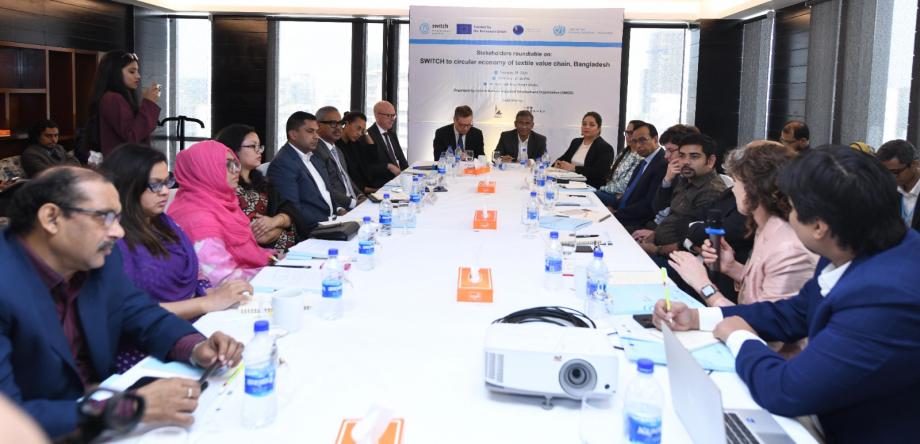
Over the past two decades, Bangladesh has made impressive economic progress, especially in the Ready-Made Garments (RMG) sector. Currently, Bangladesh is the world’s second largest garment exporter accounting for 84% of the country’s exports. On the other hand, Bangladesh is generating around 600,000 tons of textile and garments waste every year. How can the country address the associated environmental challenges in a sustainable manner? What are the enabling factors for a sustainable switch to a more circular RMG sector, while keeping its competitive edge?
This was the focus of the stakeholders’ round table “SWITCH to circular economy of textile value chain in Bangladesh”, organized by UNIDO, Nordic Chamber of Commerce and Industry (NCCI) and Bangladesh Garment Manufacturers and Exporters Association (BGMEA), bringing together a wide range of stakeholders: the government, policy makers, the private sector, development partners, academia and think tanks.
Opened by Dr. Zaki Uz Zaman, UNIDO Representative in Bangladesh, the round table also featured the participation of Anna Svantesson, First Secretary Head of Political, Trade and Communication Section Embassy of Sweden, and of His Excellency Mr. Charles Whiteley, Ambassador and Head of Delegation of the European Union to Bangladesh.
During his keynote speech, his Excellency Mr. Charles Whiteley stated ”I would like to congratulate the textile sector in Bangladesh for its readiness and capacity to successfully respond to market changes and grasp the opportunities. As the European Union we will offer continued support for the green transition in Bangladesh, including an investment framework to accompany the green transition in Bangladesh.”
A panel discussion, moderated by UNIDO Chief Technical Advisor Mark Draeck, was joined by representatives of Chatham House, H&M, Bangladesh Garment Manufacturers and Exporters Association (BGMEA) and Director General WTO cell and Additional Secratary, Ministry of Commerce.
The panelists provided valuable insights on the policy, technology innovation, trade, and finance context for the circular economy in the textile sector. Mr. Farruque Hassan, President of BGMEA, underlined the ambition for Bangladesh to become the textile recycling hub, to seize the demand for greening the industry as a commercial opportunity, and to grow and diversify the export market. Participants also emphasized the needed for joint efforts from all stakeholders within the industry, as well as an enabling environmental governance framework, in tackling the environmental challenges in a sustainable manner.
The roundtable concluded with a number of recommendations on raising awareness on circularity among textile and fashion industry stakeholders, identifying policy eco-systems for the textile industry, as well as rethinking the approach of the textile waste, in order to enable an inclusive and sustainable economic growth.
UNIDO-led SWITCH to Circular Economy Value Chains project (SWITCH2CE), co-funded by the European Union and the Government of Finland, works with EU multinational companies and their suppliers from developing countries to switch to more circular economy approaches and practices in three selected value chains: Plastic Packaging, Textile&Garments, and ICT&Electronics.